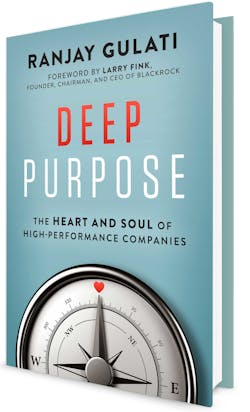Creating a Culture of Inspired Workers
I’d like to tell you about two amazing Indian women in their 20s who both were starting their careers and trying to make a mark for themselves.
On November 26, 2008, 23-year-old Mallika Jagad was overseeing a banquet at Mumbai’s Taj Hotel. At about 9:30 in the evening, she heard popping sounds. Her phone buzzed with alerts about a shooting in the hotel. Although frightened, she focused on ensuring her guests’ safety. She locked the doors of the function room, calmly asking guests to lie down on the floor. Over the next several hours, as gunshots rang out and fires raged nearby, she continued to keep her guests safe and see to their needs.
Eventually, Mallika and her colleagues managed to break a window and get a fire truck to move its ladder so the guests could escape. Only after the last guest left did Mallika follow. As one guest later said, “The level of calm and composure the staff displayed was amazing, absolutely amazing.” Mallika told me she was utterly terrified throughout this ordeal, but she felt responsible and was simply doing her job.
The second young woman I’d like to tell you about, Shipra Kumari, worked at the global Indian firm Mahindra selling tractors and harvesters. In 2020, a crisis erupted among farmers in the Indian state of Haryana. Their crops were ready for harvest, but because of the pandemic they lacked people to do the work. Many of these farmers were poor—without revenue from these crops, they would face financial ruin.
A typical salesperson who heard about these difficulties might have dismissed them as none of their concern. Not Shipra. Tapping her network, she spent many hours identifying harvester machines operating in the area and helping local farmers arrange to borrow or rent them. Shipra had nothing to gain here, but she felt obliged to help. Thanks to her, a large number of farmers were able to harvest their crops.
Mallika and Shipra both showed extraordinary commitment to their jobs and to their customers. They were willing to give selflessly—in Mallika’s case, to potentially sacrifice her life. In both cases, courageous action arose out of a belief that their work wasn’t merely a job, but a calling, something that deeply inspired them.
Context Above Character
I’ve long been fascinated with inspired workers. Who are they? Why do they do what they do? I started posing these questions as a child working in my mother’s business—I marveled at how passionately she and her colleagues pursued her start-up’s mission of bringing traditional Indian craftsmanship to the wider world. I initially regarded the ability to be inspired as a character trait. But I have now come to realize that the context in which we are placed matters a whole lot more.
Like my mother’s business, the companies that employ Mallika and Shipra cultivate a different, more inspired workplace experience. At Taj Hotels and Mahindra, deeply committed and inspired employees are the rule. Not “satisfied” or “engaged” employees. Inspired. These employees give their utmost not because they have to but because they want to.
Peek inside most firms, and you find they operate along transactional lines. It’s “you do this for me, I’ll do this for you.” Managers want employees to perform, and they presume that they must pay for that performance. They also presume that humans are motivated solely by self-interest and perhaps a bit of interesting work. I call it the coin-operated monkey theory of management. Pop in a coin and the monkey dances. Make the dance a bit more fun, and the monkey might dance a bit longer.
In recent decades, psychologists have demolished the coin operated monkey theory, broadening our notion of what motivates people. Yes, we humans love money, and it can motivate us to work hard. But we’re also motivated by an innate drive for something deeper: meaning and purpose. This is the basis for inspired work.
Research shows that depending on our own individual propensities and organizational context, we settle into one of three ways of thinking about our jobs. Some of us think of our job as work for financial returns, others as a career to move up a ladder, and still others as a calling where work brings meaning and purpose in our lives. We want all three to varying degrees, but usually one principal tendency drives us.
A Great Rethink
In the aftermath of the pandemic and the great resignation, more of us want our lives and our actions to count for something. We want to feel connected to other people and the world outside us. Meaning and purpose deliver all this, helping us to feel more rooted, stable, focused, and driven. Research shows that having a purpose helps us avoid mental illness, feel happier, be more productive, and live longer. And these days, the idea that we can live compartmentalized lives with “work” and “life” being separate is giving way to a search for more coherence. In this respect, the great resignation underway is actually a great re-think.
Most companies haven’t caught up with the research or emerging trends. They continue to see employees as dancing monkeys rather than feeling human beings who need to connect with a higher cause. But these two companies do it differently. By defining a company purpose and going deep on it, they create contexts in which intensely meaningful work becomes possible.
At deep purpose firms, as I call them, purpose isn’t just the buzzword du jour. It’s a foundation for the entire organization, defining everything about the work experience, including the company’s strategy, its operating systems, and its culture. In defining a purpose, deep purpose organizations usually frame it as ambitious goals that are both commercial and idealistic or social. The dual nature of these goals energizes employees and gives them a sense of pride. They know they’re not only making money for investors, but serving others in society.
Critically, deep purpose firms do even more. They encourage employees to think about and nourish their own, personal sense of purpose, and help them to connect their higher calling with the company’s. As a result, employees perceive the company as, in some important way, an extension of themselves—something that they own and to which they feel loyal. These firms also develop a culture that explicitly affirms employees’ shared responsibility and commitment to one another and to customers, suppliers, community, even the planet.
How do deep purpose leaders build this culture? They constantly promote the purpose both internally and externally. They tell what I call Big Stories, grand narratives that convey the significance of the purpose and the obstacles the firm will face in advancing it. They commit personally to the purpose, exemplifying it in their decision-making and their daily conduct. They take moral stands that symbolically and publicly affirm the company’s commitment to the purpose. They hold the workforce accountable for hewing to purpose and values, experimenting with new, purpose-related metrics. Finally, they see to it that the purpose lives on, ensuring that their successors also understand the purpose and feel as deeply committed to it as they do.
Again, all this isn’t pay for performance. It’s performance on behalf of purpose.
She meant, of course, that she hoped I’d be inspired by what I did the way she was by her work.
Happily, I am. And I now know that it isn’t just we as individuals who determine whether we love what we do. It’s the context in which we work.
Ranjay Gulati is the author of Deep Purpose: The Heart and Soul of High-Performance Companies (Harper Business: 2022). He is the Paul R. Lawrence MBA Class of 1942 Professor and the former unit head of the Organizational Behavior Unit at Harvard Business School.

